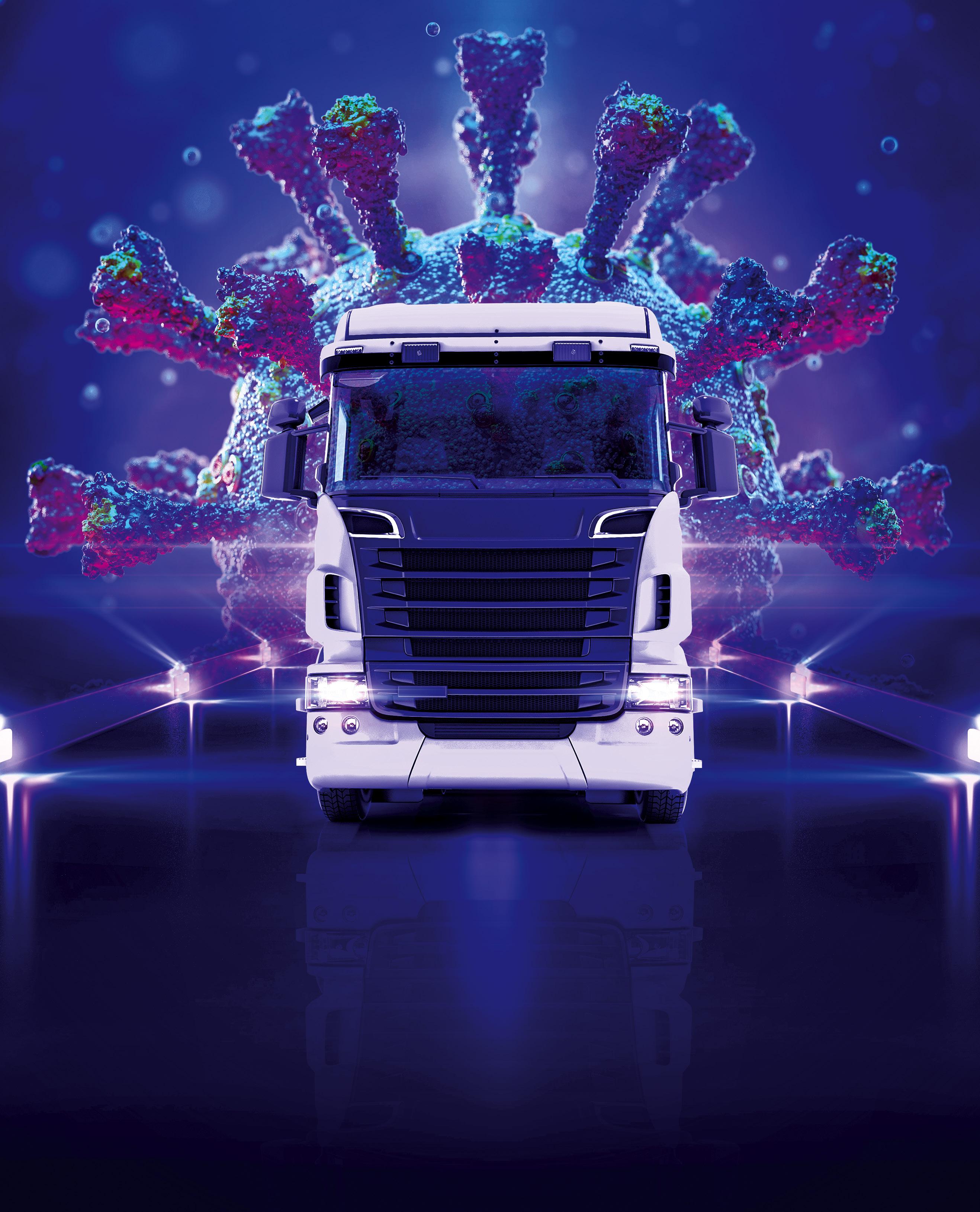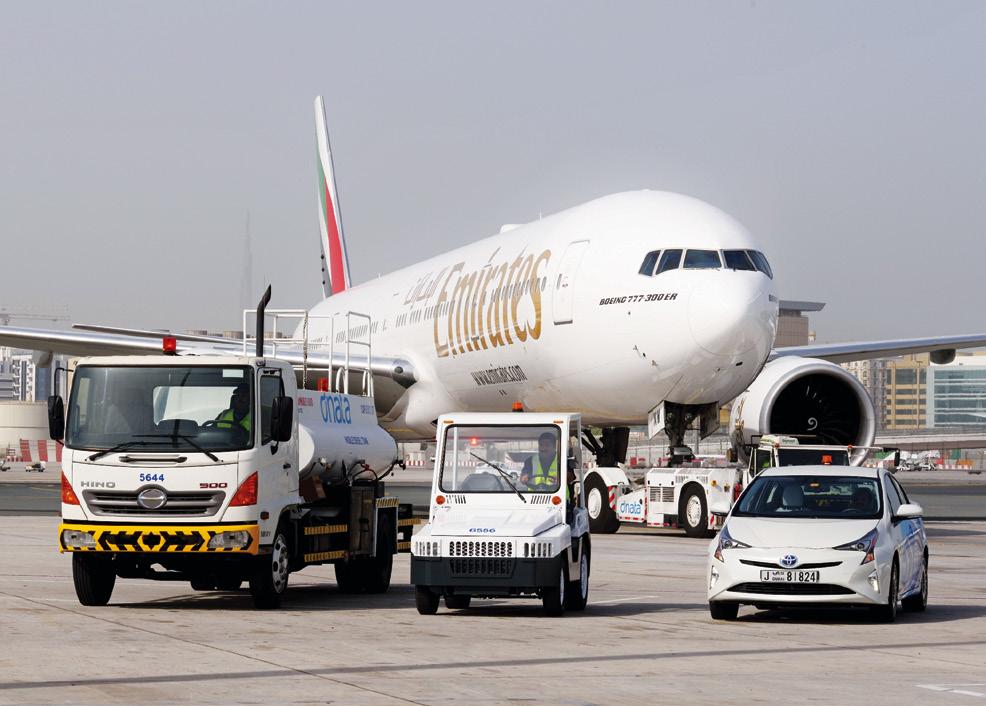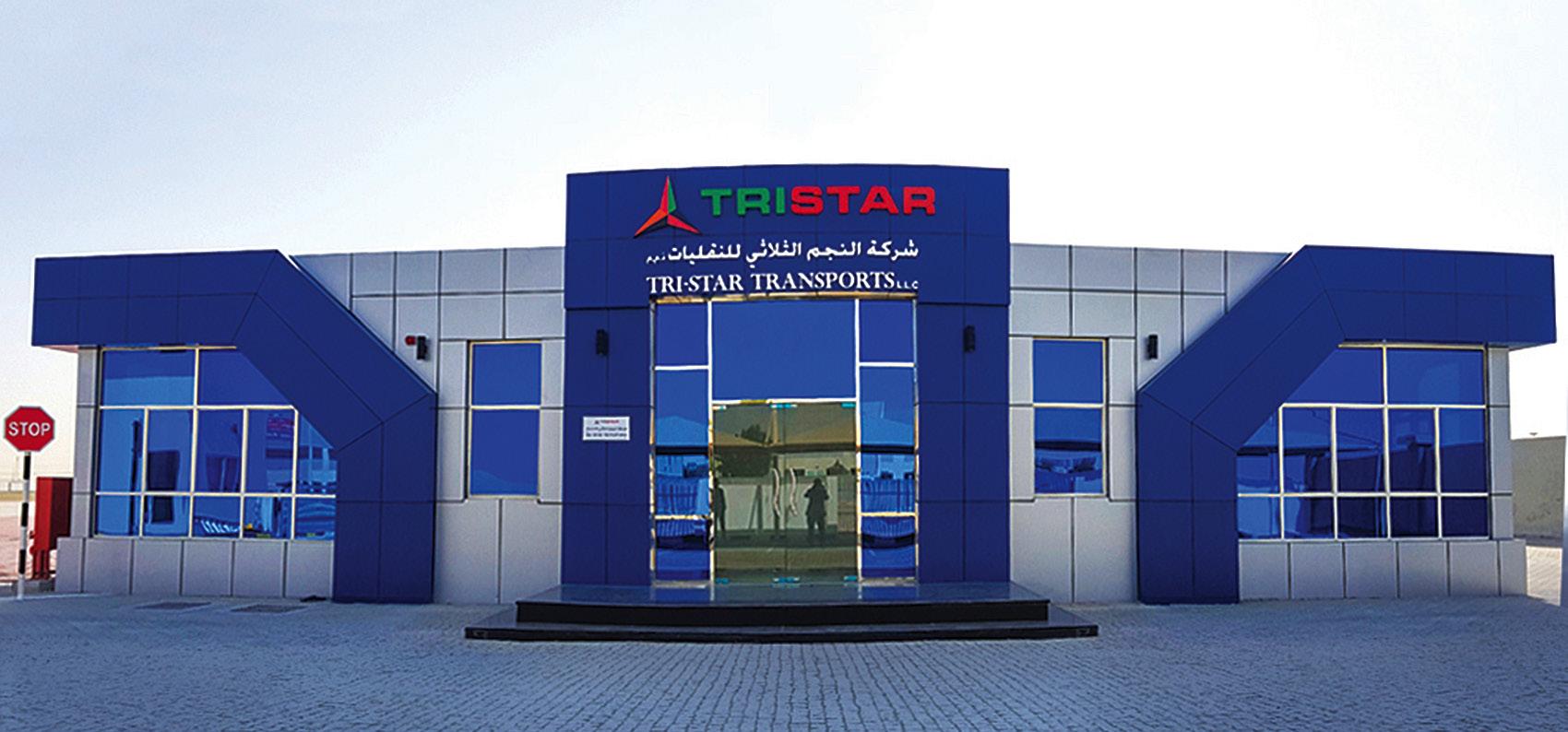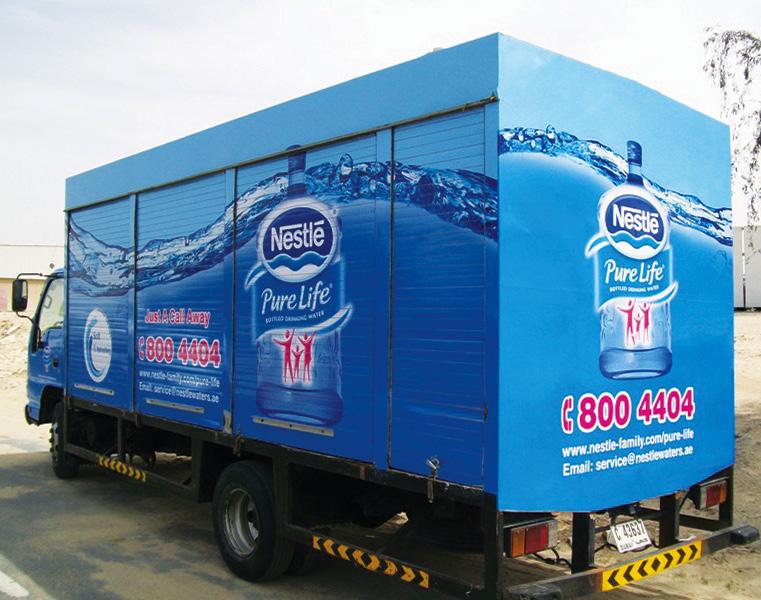
11 minute read
A NEW NORMAL
DELIVERIES
Al Rawabi has launched a new CSR initiative that will see it deliver free food to hospitals in the UAE via the ministry of health.
The functional products can boost immune systems which will ‘give each of us an edge in staying healthy’ during the Coronavirus (COVID-19) outbreak, claimed the dairy food specialist.
The functional products, which are enriched with multivitamins and minerals, were designed to help solve the major health concerns of the GCC population, such as Vitamin D deficiency, which can lead to bone metabolism disorders, rickets in children, cancer, cardiovascular disease, diabetes, and much more, explained the company in a statement.
“We are not powerless,” added Dr Ahmed El Tigani, CEO, Al Rawabi Dairy Company. “In a time where everyone is looking at how to protect himself from COVID-19, Al Rawabi is committed to boosting your health by improving the well-being of your immune system.”
A truck delivering Al Rawabi functional products (Vitamin D, Nutree Boost, Orange Juice, Super Milk) will be delivered daily to the ministry of health in the UAE, “who will be taking care of distributing the products within the hospitals’ network to everyone, from the medical staff to their patients, to boost their immune system.
“Right now, what matters most is guaranteeing everyone’s safety and immunity. We want to salute our doctors and medical staff and support them as much as we can.” AL RAWABI COMMITS TO FREE HOSPITAL FOOD DELIVERIES
SAUDI CEMENT SECTOR NOT HIT BY CORONAVIRUS PANDEMIC IN Q1 2020
MATERIALS
The Saudi cement sector has not witnessed any impact from the coronavirus pandemic in terms of the year-on-year volume growth during the first quarter of 2020, a new report from Al Rajhi Capital has found.
According to the report, the total market volume in Q1 grew by 33% on an average, when compared to the previous year. When combined together, the companies under the report’s coverage also witnessed similar year-on-year average growth, it added.
From the companies under its coverage, Qassim Cement reported the highest y-o-y growth of 53%, followed by Yanbu Cement and Yamama Cement, with y-o-y growth of 43% and 38% respectively.
However, restrictions imposed by the government to reduce the spread of the virus have resulted in project delays, the report said, adding that this may directly impact the demand in the Kingdom, which cause under-utilisation of capacities.
Along with the Ramadan season, these circumstances are expected to lower cement

volumes and thereby the revenue of producers, mainly in the month of April and May. The report added that Tabuk Cement has already made an announcement, stating that it expects the impact of the coronavirus epidemic to be reflected in its financial results.
The pandemic has further hit oil prices, driving them to their lowest, which means that government spending could be curbed within the country. This could disrupt current and future projects, including housing and infrastructure, the report concluded.
SERVEU LAUNCHES A NEW DISINFECTION SERVICES
SERVICES
ServeU, has launched a new line of specialised disinfection services in the UAE.
The Union Properties leading facilities management service provider is offering “a full set of cleaning and disinfection services” for customers across businesses, offices and residential properties, including sanitisation and disinfectant treatment at their accommodation and offices.
ServeU confirmed it will only use products which meet the “highest international standards for healthcare disinfection and comply with all of OSHA regulations as well as being certified by Dubai Municipality.”
“The new services include the disinfection and sanitisation of all surfaces including hard to reach areas,” said Gary Reader, general manager, ServeU. “Our cleaners comply with Covid-19 measures and are daily disinfecting and sanitising workplaces, buildings and homes to prevent the further spread of the virus.”

Operators from across the industry share their experience and good practice to keep fleets safe during the pandemic HELP FROM UNSUNG HEROES

One of the positives to come out of the recent jolt to the market has been the eagerness of companies across the industry to share their advice to others on how best to adjust to the so-called new normal we are all facing. Case in point, a webinar hosted by Dubai Chamber and supported by UAE Roadsafety last month that brought together a wide selection of fleet and operations managers to discuss how they are the introducing new practices to ensure their drivers and workforce can stay safe and healthy during the Coronavirus (COVID-19) outbreak.
Syed Atif Ali, program manager CSR, Dubai Chamber, said he wanted the event to get member companies to share then steps they taking to protect their employees and, in particular, their drivers from exposure to COVID-19.
“The aim (of this webinar) is to address the health and safety of commercial drivers as they are likely to be at higher risk during this pandemic due to the exposure they get,” said Atif Ali. “They are the unsung heroes delivering critical medical and food supplies in this time of crisis.”
Having spread from the Chinese city of Wuhan at the turn of the year, the UAE first began introducing measures to tackle the spread of the virus in March before enforcing a lockdown of the country on Saturday, 4 April. Firms were suddenly forced to implement measures that meant an unprecedented strain on their day-to-day operations such as infection control and safe work practices; the acquisition of Personal Protective Equipment (PPE) to prevent worker and driver exposure; while addressing the need to keep vehicles out on the road sanitised.
“Since this is an ongoing situation, we are all learning how to deal with it,” Atif Ali sums up. “We recognise that our member companies are committed to comply with regulatory requirements and have adopted industrial practices to the best of their knowledge.”
Roshan Menon, quality and safety manager, Emirates, stressed that social distancing will become the ‘new norm’ even in the travel and hospitality sectors.
He added that the famous brand is looking at the use of synthetic partition and isolators that segregate the passenger and driver as way of enabling the safe sharing of vehicles.
A PICTURE OF HOW THINGS USED TO BE
Sectors like hospitality are having to re-think the way they engage with their passengers and clients.



TAKING COVID-19 HEAD-ON
Dulsco’s Fenu Rehana said that its new safety precautions are part of a strategy to tackle the threat of the pandemic ‘head-on’.

In the aftermath of the outbreak the world it has issued instructions within its Transport Services set-up asking providers to improve their vehicle sanitisation practices and driver management processes to safeguard colleagues and passengers.
“As a precautionary control, providers have been instructed to create and monitor infection control procedures that include daily health monitoring of drivers (using thermal scanning) at their accommodation and workshops, and increased cleaning with alcohol-based products,” he explained.
Part of the sanitisation measures include explicit advice to ensure every vehicle is wiped down at the start of every shift. Drivers are also being frequently briefed on good hygiene practices that follow WHO (World Health Organisation) and Dubai Health Authority guidelines. If a driver has been quarantined or asked to do a health check, the assigned vehicle must be isolated and washed down.
“The Transport Services Health and Safety team are validating this through periodic audits,” he said.
Fenu Rehana is a manager at Dulsco’s own health and safety executive. To protect its 14,000-strong workforce and the communities they serve, he said the services company is, “actively implementing our business continuity plan and implementing all the health and safety measures for our staff and communities first. We at Dulsco have a motto of powering better communities and we believe that this is the time are to stand and deliver.”
According to Rehana, the key to successfully implementing its own Covid-19 safety programme is transparency, flexibility and resilience.
“We are taking this head-on,” affirms Rehana. “We have a Covid Action Group which meets daily and discusses all proactive measures to mitigate the risk. We also have a our HSE training team which is commissioned to do sanitisation. (They are) very important at present for transportation where we have a lot of buses.”
The company started early with its anti-coronavirus strategy in March; setting up hundreds of sanitiser facilities throughout its offices and employee accommodation, as well as implementing sanitisation programmes for its fleet. You cannot now enter a Dulsco facility without passing through a disinfectant zone and buses used to carry workers have been fitted out with sheeting to protect drivers and passengers.
With their vehicles ventilated and cleaned using disinfectant before each shift, drivers are being checked to see if they have a temperature before going out onto the road. They are furthermore responsible for the safety of passengers.
“They are being asked to take the lead and ensure everyone boarding the bus is being checked for a temperature,” he revealed.
Getting information on the risks being posed by Coronavirus out into the workforce was critical during the early stages within Dulsco, he added.
“Prior to this pandemic, we started escalating with a lot of sessions done by doctors close to our accommodation. We have done a lot of training in terms of cleaning and sanitising.”
Much of this training is now being conducted online and workers can access pages of information in a multitude of languages to ensure that it is easy for everyone to understand the precautions they need to take.
“We have started online and offline platforms and toolbox of is one of the most important to communicate all these messages to drivers as basically one-to-one or face-toface training is not allowed and it is difficult to get training done,” he said. “When they go out to the communities in vehicles and buses, we want to give them the right brief on how to sanitise and how to get their PPE ready. We provide waste management PPE and safety glasses to all employees.”
In addition to these measures, the company is using posters as part of the ongoing awareness drive to keep people safe.
“Everybody is aware of the preventive measures in place and the new guidelines that needs to be followed which on a daily basis we get from the government and the authorities. Transport, buses and waste management vehicles are mobile environment prone to the spread of infectious diseases such as cold and flues. And specifically in terms of Coronavirus, it is very important to sanitise those vehicles.”
Sundarmoorthy Hariharaiyer, manager, Warehousing & Transportation at Transworld said the logistics and shipping company was now closely guarding its facilities against the threat posed by the outbreak.
“Our security personnel at the Entry/ Exit gate post check the temperature of all visitors, customers and employees. If their temperature is above 37°Celsius they do not allow that person inside
A VITAL ROLE TO PLAY
Throughout the pandemic, transportation and logistics firms have continued to keep going to ensure the vital products like food remain in the market.

MISSION CONTROL
Tristar has launched a Mission Control team that ensures that health and safety guidelines are understood by its teams.

the premises and advise them to go to a medical clinic,” he began.
Hand sanitiser dispensers have been installed throughout all locations and employees have been advised to regularly use sanitiser during the day to reduce risk of infection. All employees are meanwhile asked to wear medical masks and hand gloves to protect against infection. Drivers must run through a series of check and sanitise the vehicle completely, “before he starts the vehicle.”
Like Dulsco, briefings have become a daily ritual at the company with the Group HR CSR team playing a vital role, he added: “By educating our employees and revealing the importance of Safety Health, and routine basic medical check ups are conducted at our premises for everyone.”


“The basic medical check-up is free for employees who work on the floor,” Hariharaiye commented. “So they all are well aware about the precautions that need to be taken. On top of that, within the company, we have a dedicated doctor who visits once a month to our office and guides all of our employees and understand their problems.”
At the start of the lockdown over two-thirds (70%) of the Transworld staff were forced to work from home but the company was able to fall back on its cloudordering system to keep sales, warehousing and logistics operations connected.
“We were the first in the industry to switch to cloud... Everything is digitalised. No customer needs to call; with the click of a button they can get the details: for instance,






